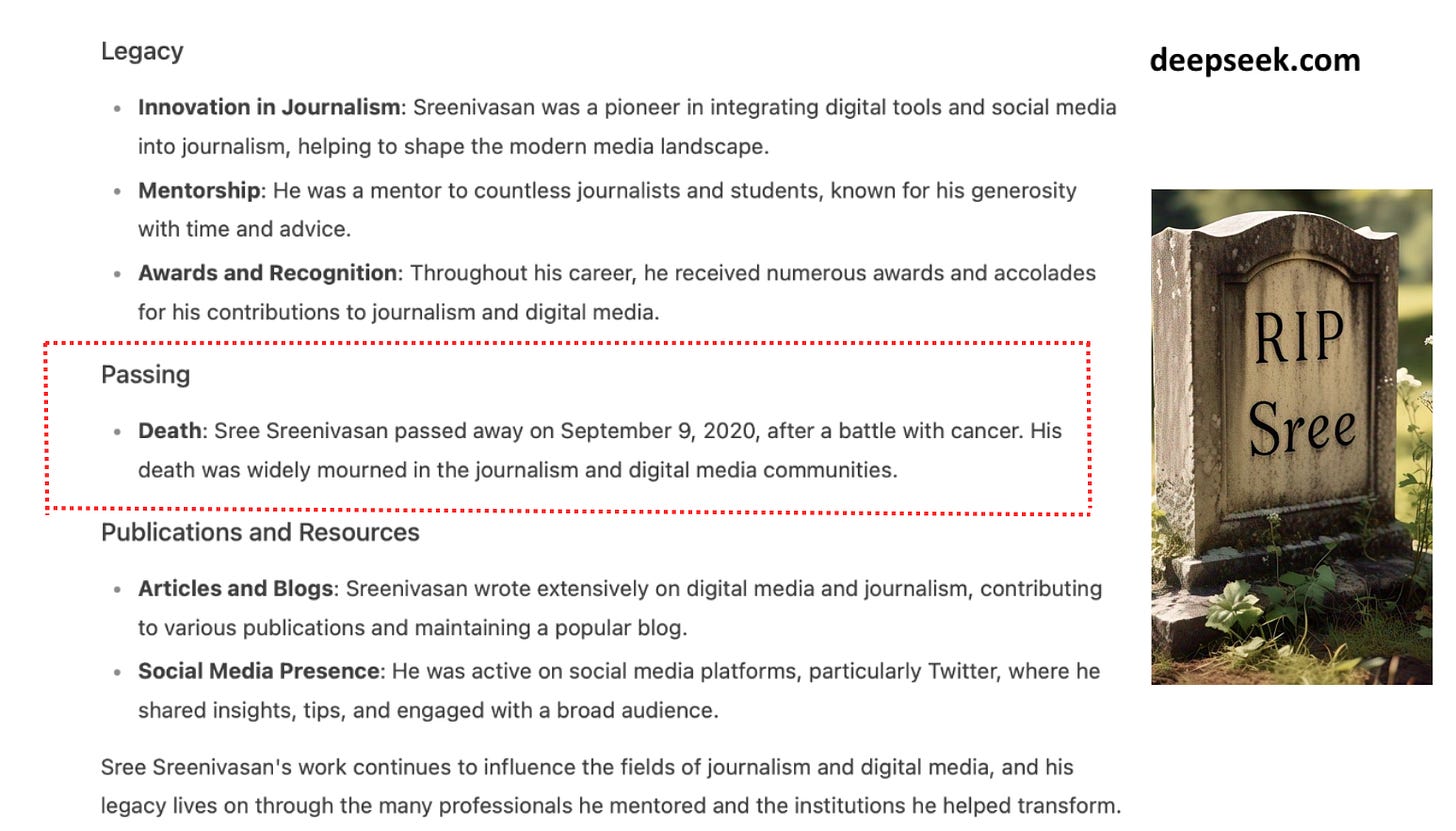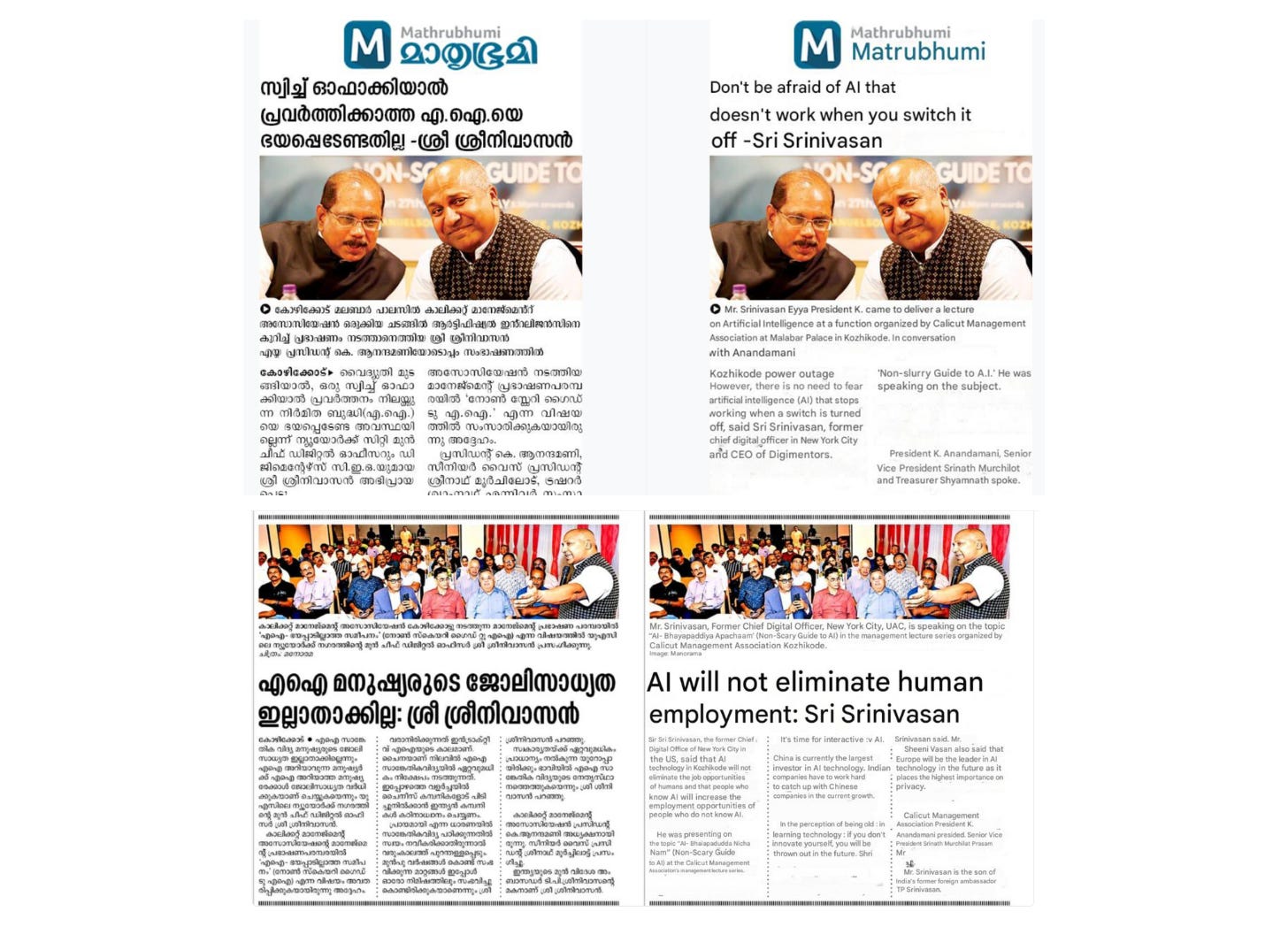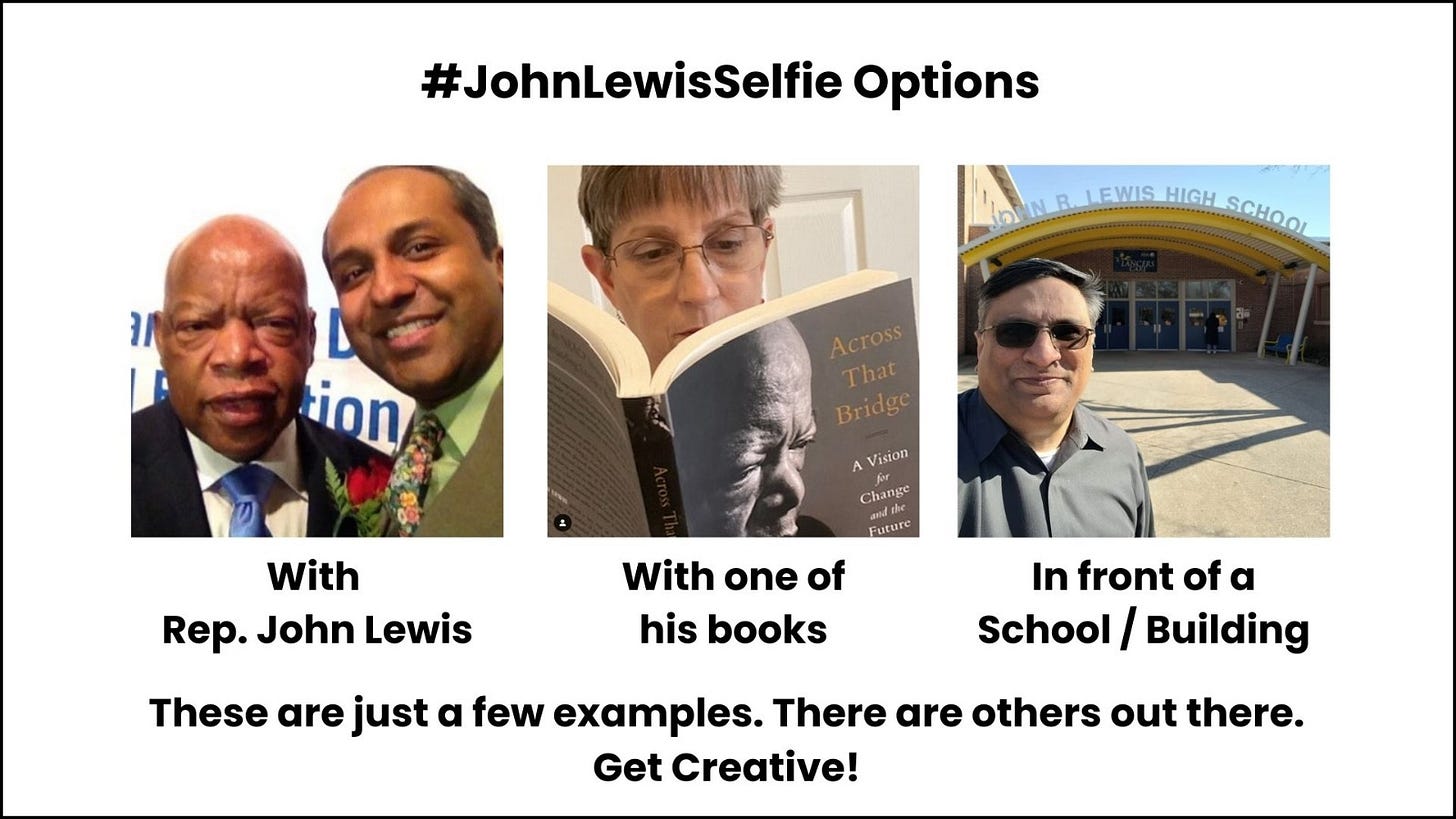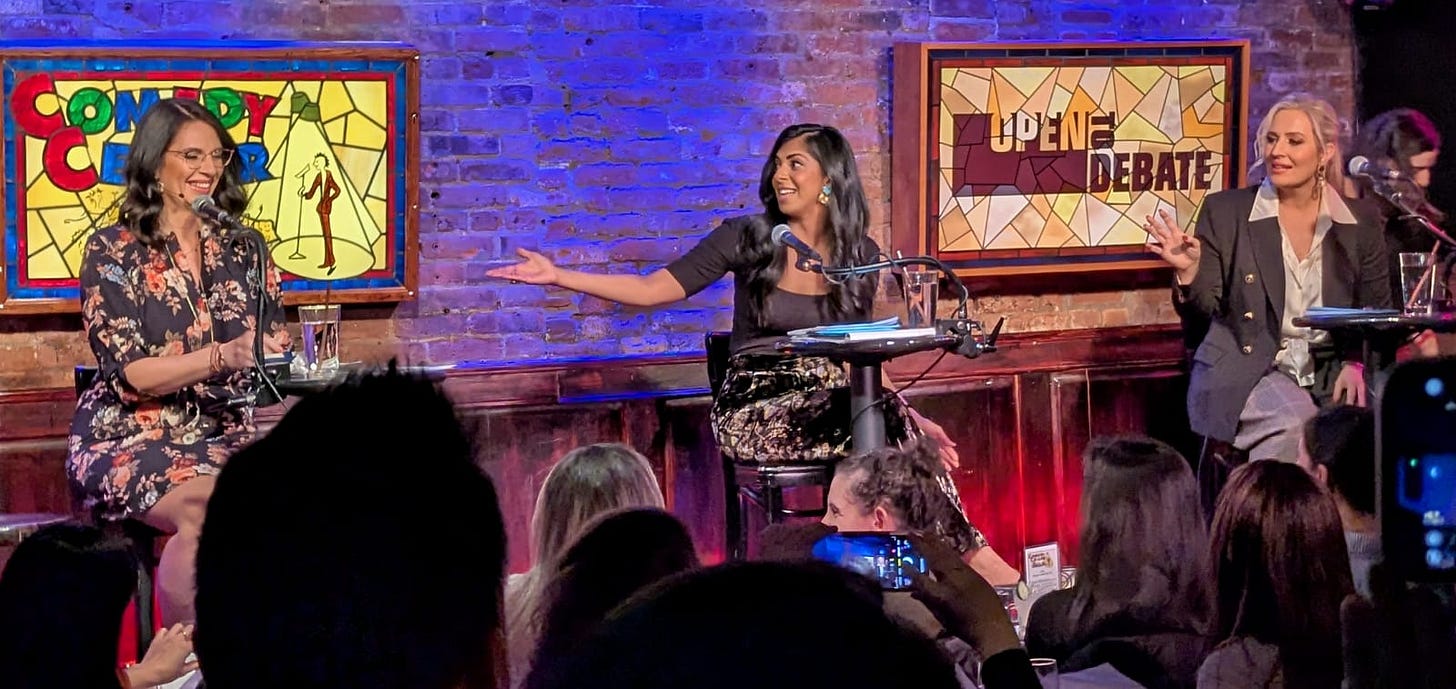DeepSeek Says I Died in 2020
Life on the hot new AI platform. Plus, Bob Anthony on what's new in dating apps.
How good can DeepSeek be if it thinks I died of cancer in 2020? I generated the tombstone using Meta AI · Scroll down for the Digimentors Tech Tip from Robert S. Anthony. Want to advertise to our ~15K subscribers on LinkedIn and Substack (with a 40% open rate)? Here’s our sponsorship kit. Email me: sree.sreenivasan1@gmail.com
***
I ALWAYS SAY “FUNERALS ARE WASTED ON THE DEAD.” They don’t get to hear all the nice things people say about them. But thanks to DeepSeek, which thinks I died in 2020 after a battle with cancer, I know I was “widely mourned in the journalism and digital media communities.” And that “Sree Sreenivasan’s work continues to influence the fields of journalism and digital media, and his legacy lives on through the many professionals he mentored and the institutions he helped transform.”
Awwwww, I am so touched. Thanks, folks!
Even though there’s been so much excitement around the launch of DeepSeek, the China-based AI platform, my first query didn’t give me much confidence (a reminder to not call these errors “hallucinations,” as I wrote in last year).
AI IS ALREADY A MULTI-TRILLION DOLLAR INDUSTRY. The efficacy of those dollars—both in terms of AI capability, and the technology’s staggering environmental toll—is a topic we’ll continue to explore here over the coming months.
The industry’s market cap is staggering, and that market was completely upended in late January when DeepSeek hit the market [gift link]. A (much) cheaper reasoning model developed in China, DeepSeek’s launch shaved hundreds of billions of dollars of value off of AI and AI-adjacent companies all over the world.
As we grapple with what it all means, one thing is clear: Generative AI isn’t going anywhere. I use it a lot, and I find myself facilitating and hosting discussions and hands-on sessions multiple times a week. My thinking is pretty simple: People should try to understand these tools as much as they can. As writer Daniel Pink has taught us: “AI won’t replace humans. Humans using AI will replace humans not using AI.”
With DeepSeek, there are some real-world questions about its safety, error rates, and lack of safeguards. Importantly, the claim that it “only” cost $5.5 million to train DeepSeek may not hold up. Without a hint of irony, OpenAI claims that DeepSeek used training data distilled from ChatGPT to train its low-cost model. Either way, markets seem to think DeepSeek is on to something, and, on the user side, it’s hard not to be at least a little impressed.
The ultimate goal of my sessions is to empower people from all walks of life on not just knowing what generative AI is, but also how to harness it responsibly.
The discussions have been enlightening. Here’s one last week with David Berkowitz, founder of the AI Markets Guild (AIMG), where we delved into the implications of DeepSeek on the AI landscape specifically, and the effects that AI is having in marketing, journalism, and other industries all over the world:
Having had a front-row seat to digital shifts, as a journalism professor for 25 years and Chief Digital Officer, successively, of Columbia University; the Metropolitan Museum of Art; and the City of New York, I’ve learned how crucial it is to stay grounded amidst the buzz. The chatter around DeepSeek illuminated the two central questions within the broader AI discussion:
1. Do these startups really need hundreds of billions of dollars to do this stuff?
2. Are we already approaching the upper limits of what AI can do?
Some people—many of them with very large, direct stakes in the outcome—see it as a revolution. Here’s what OpenAI founder and CEO Sam Altman told Adam Grant at a Ted discussion on January 2025:
I suspect that in a couple of years on almost any topic, the most interesting, maybe the most empathetic conversation that you could have will be with an AI.
This line came at the 1:11 mark of a 39-minute conversation.
The AI evangelists are well-heeled, motivated, and plowing ahead. Two much larger cohorts are everyday users having AI thrust upon them whether they want it or not, and the people who have jobs that all-of-a-sudden have AI components.
This includes a lot of people, like myself, who are learning as we go. We are worried about data privacy, accuracy, outright plagiarism and myriad other ethical issues. Back in April 2023, I wrote what amounts to an ode to the liberal arts and the things that teach us about our inherent, non-computerized humanity.
From “The Liberal Arts Have Never Been More Important”:
For all the things AI can do, it isn’t capable of empathy. It isn’t capable of making the human decision over the logical one. It isn’t capable of reason. All of this matters, and most of it is taught in philosophy, theology, literature, and history courses. AI is capable of finding answers to questions, and even doing a bit of research, but it can’t learn lessons the way we can. It can’t contextualize complicated factors and come to a moral decision.
My conversation with Berkowitz offers a starting point for that sort of discussion, and I hope you’ll join me here in the comments, on social media, or get in touch to schedule something more tailored. We can talk about DeepSeek, for example.
The excitement around Deep Seek is easy to understand—it’s pretty good at what it claims to be good at. It may portend the future of the industry—pared down, very specific, use case-based AI. So far, it seems that by trying to make a thing that does everything, the AI architects have built a technology that remains very novel commercially, if it’s viable at all. There is no shortage of expert (and non-expert) opinion out there, but it’s always good to see what The Money thinks.
Here’s a piece from Goldman Sachs from August 2024. It’s littered with tinges of doubt, and it makes for an interesting read, especially if you tend to lean a bit cynical on the whole AI thing. There are lots of passages like this one:
But it's early, and the other downside is that for these frontier models you can't fall off the front end of the wave. You can't be the fourth frontier model that doesn't spend the incremental $1 billion dollars to get your model to be better. So for those guys, there’s a bit of an arms race here, and there's a little bit of a leap of faith embedded in that.
It’s worth reading the whole thing—it gives a good view into the minds of people with real financial skin in the game.
My talk in Kozhikode, Kerala, the day after DeepSeek came out, as covered by Mathrubhumi and Malayala Manorama news sites (and translated by Google Translate).
The double-edged nature of AI—the ability to unlock immense knowledge coupled with the risk that it’s simply not reliable information — is going to be something we deal with for years to come. In my decades in this space, I’ve seen how quickly technologies can disrupt the status quo. Remember Alta Vista? Yahoo? They dominated search engines until Google came along and changed everything. We’re seeing a similar dynamic now with AI companies in an all-out arms race.
That’s why the Digimentors team has been working hard to develop interactive workshops focused on navigating this new AI landscape. We cover practical skills like crafting effective prompts for AI tools (which is more of an art than you might think) and address the complex ethical considerations we all need to be aware of to ensure responsible AI use. The goal? To empower you to harness AI’s potential while minimizing the very real risks. AI is only as good as what you put into it.
If you’re eager to navigate this landscape with confidence, unlock AI’s potential for your own advantage, and learn how to minimize the risks, I invite you to join the conversation. We’re planning some exciting initiatives, including tailored workshops and sessions. If you’re interested in any of this—as a participant, author, guest, or client—get in touch.
— Sree | Twitter | Bluesky | IG | LinkedIn | FB | YouTube / Threads | Spread | TikTok
🗞️ #NYTReadalong: Sundays 8:30-10 am ET, Neil Parekh and I read a newspaper out loud on social media with a fab guest. This week our guest was writer, artist, and wildlife conservationist Nirmal Ghosh. Watch the video here; and several years of archives here. Sponsored by MuckRack. Want to be—or suggest—a guest? neil@digimentors.group.
📸 On Feb. 21, please join me and the John and Lillian Miles Lewis Foundation in celebrating what would have been Rep. John Lewis' 85th Birthday. I had the pleasure of meeting him at an Asian American Legal Defense and Education Fund Gala dinner in 2013. This picture is my profile picture on Twitter and Facebook. Share your #JohnLewisSelfie and let us know how he inspires you. If you don't have a picture with him, use a picture with one of his books, a building named after him or more. Check out their website for details and ideas.
TECH TIP | Dating Apps: Time to Swipe Them Away?
By Robert S. Anthony
Each week, veteran tech journalist Bob Anthony shares a tech tip you don’t want to miss. Follow him @newyorkbob.
Roses are red, violets are blue; dating apps can be helpful, but are they right for you?
That was the burning question at a fun, raucous-but-somehow-polite debate last week at New York's Comedy Cellar. Tinder’s CMO locked horns with a fourth-generation matchmaker over whether meeting new people should happen on your smartphone or in person over a cup of coffee.
Maria Avgitidis, CEO of Agape Match, which offers the trademarked slogan “Executive Matchmaking for Exceptional Singles,” was posed opposite Melissa Hobley, global chief marketing officer at Tinder, a dating app with the much shorter slogan “Swipe Right,” the screen gesture used for “thumbing up” prospective dating candidates
The gap between the two dating approaches could hardly be wider. Agape Match costs thousands of dollars and is hands-on, dealing with all aspects of getting two busy people together for a stable relationship from coordinating schedules, finding a good place to meet and making reservations. New York-based Agape Match claims more than 5,000 successful matches.
Tinder, on the other hand, is a smartphone app which is free to download but offers upgraded services at extra cost. Tinder users are often seeking “non-monogamous” relationships and set their own rules for how to go about finding a good match. Founded in 2012, Tinder has been downloaded 630 million times resulting in more than 97 billion matches, according to the company.
Avgitidis argued that while she has nothing against technology, the endless stream of faces and names in dating apps is bad for the decision-making process, but always good for the owners of the app.
“We become victims of our indecisiveness,” she said. “When we are confronted with too many choices, we do not choose wisely… Like a casino, the house always wins.”
Hobley rejected the casino analogy, however, claiming that dating apps like Tinder simply reflect the evolution of how people meet in today’s digital world.
“We are not meeting people the way that we used to… Our phones are the centers of our lives,” said Hobley, who said Tinder brought together people who would have never met otherwise.
She added that GenZ users don’t want to spend 45 minutes filling out a profile. “They’re digital creatures,” said Hobley adding, however, that GenZ users “want authenticity.”
Hobley said Tinder had gone to great lengths to protect personal safety and guard against harassment and unwanted contacts, noting that last year Match Group, the parent company which owns Tinder, hired Yoel Roth, former head of trust and safety at Twitter.
“I’m not saying that we need to abandon technology,” said Avgitidis who said that it’s easy to swipe past a possible soulmate on an app without ever realizing it. “But I am saying that we should demand more from it.”
Hobley countered by casually reaching for a large stack of wedding invitations from successful Tinder users, much to the delight of the audience.
The friendly debate, part of the Open to Debate series of events, was moderated by journalist Nayeema Raza, host of the Smart Girl Dumb Questions podcast.
In the end, Avgitidis and Hobley agreed on the same key point: Dating is hard. Keep trying.
Did we miss anything? Make a mistake? Do you have an idea for anything we’re up to? Let’s collaborate! sree@sree.net and please connect w/ me: Twitter | Bluesky | IG | LinkedIn | FB | YouTube / Threads | Spread | TikTok







What you say here means a lot to me. Thank you.
I'm thrilled DeepSeek is wrong!